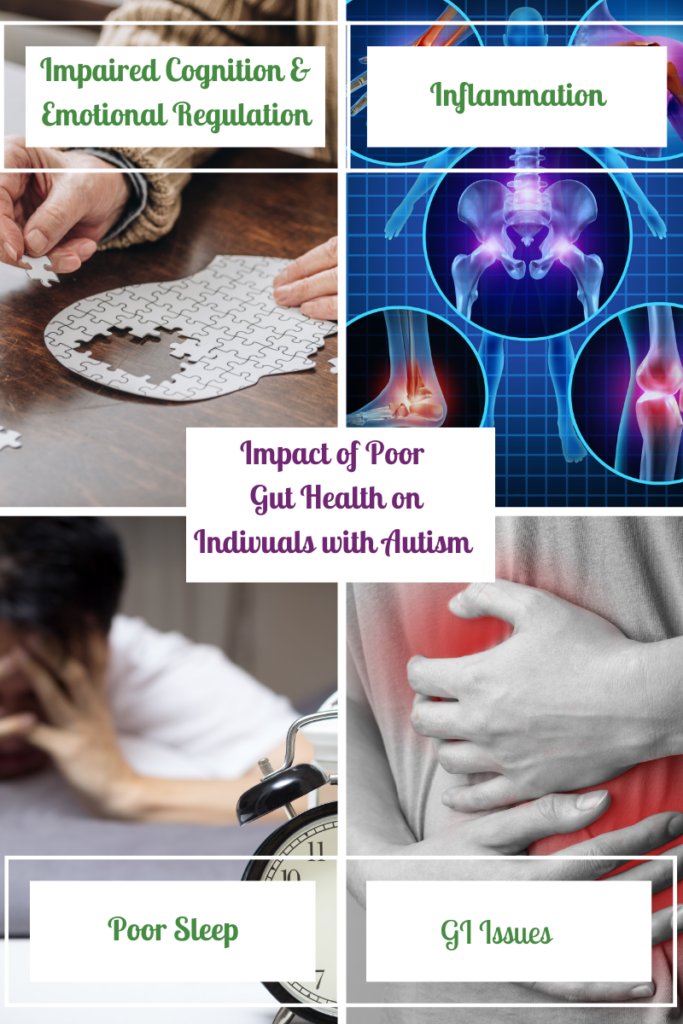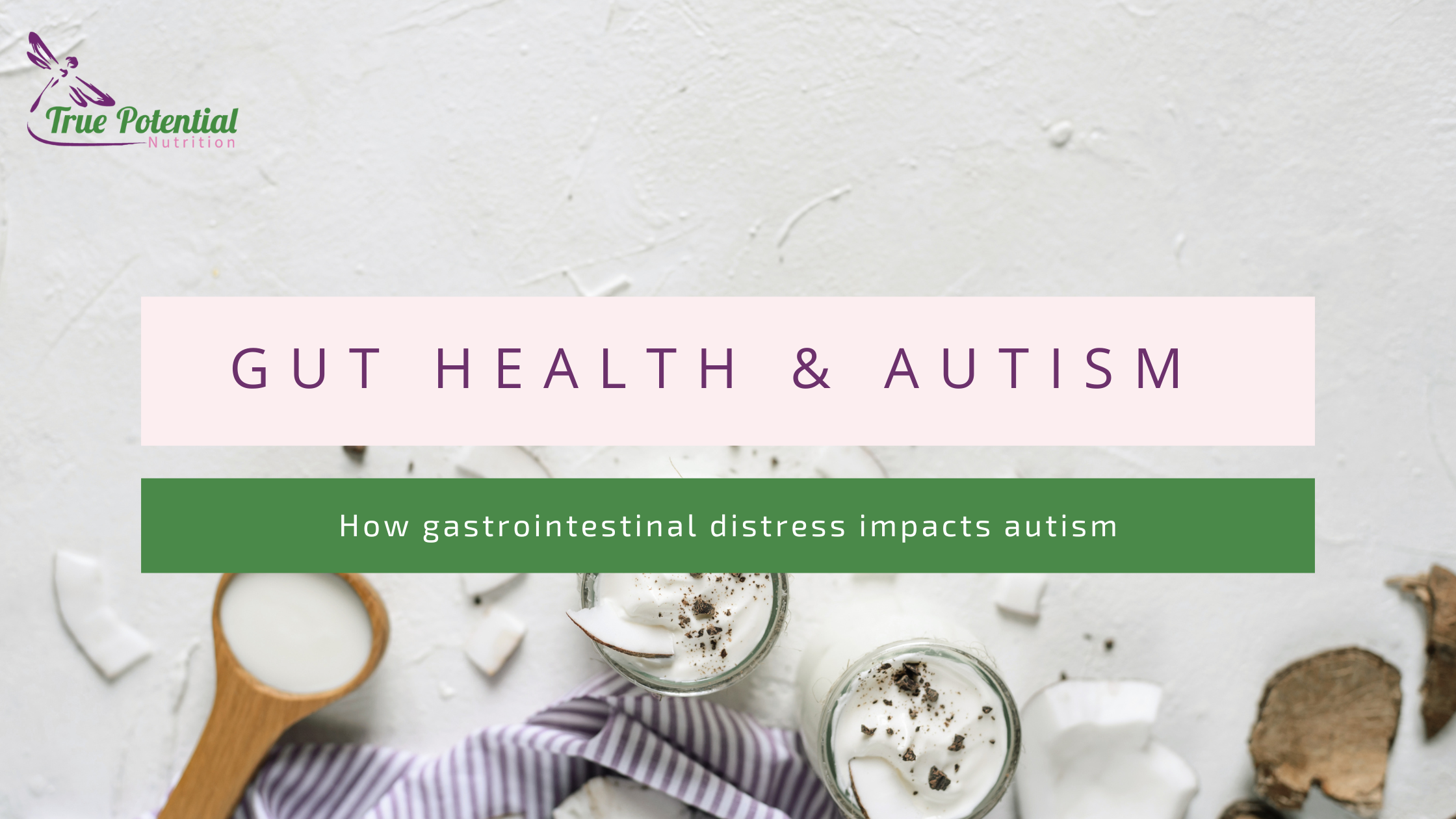By Danielle MacDowell

Main Takeaways
- Individuals with autism are more likely to experience gastrointestinal issues (GI), such as constipation, diarrhea, pain, and bloating.
- Gut issues span beyond the gut and are linked to sleep disturbances, behavioral issues, impaired cognition, and poor mental health.
- Anxiety and autism are common comorbid dianosese. GI issues and anxiety are also interlinked. So, it comes as no surprise, that anxiety has been strongly associated with chronic GI issues in individuals with ASD
- Diet is a strong predictor of gut health.
- Individuals with autism often have a limited diet, which may exacerbate GI challenges.
- Welcoming probiotic, prebiotic, and high fiber foods into a diet is important for GI health.
- Due to food selectivity, the introduction of gut-healthy foods may not be an option due to various challenges, and therefore, supplementation, or even fecal microbial transplants (FMT), may be warranted.
Table of Contents
Autism Spectrum Disorder (ASD) is a developmental disorder that is characterized by the presentation of restrictive or repetitive behavior patterns, delays in communication, and deficits in social skills. In addition to contending with the more traditional symptoms of autism, individuals with autism are more likely to experience gastrointestinal issues (GI), such as constipation, diarrhea, pain, and bloating. [1]
In spite of the prevalence of GI disturbances amongst individuals with ASD, GI issues can easily be overlooked and go undiagnosed. [2]
Gut Health and Connection to Overall Health
It comes as no surprise that GI issues span beyond localized pain and discomfort in the gut, which is why they can be so problematic. They are linked to:
- Sleep disturbances
- Behavioral issues
- Mood
- Mental health
For these reasons, it is theorized that by correcting underlying GI issues, symptom relief in areas outside of the gut may follow.
Gut Health, Sleep, And Autism
Sleep is a restorative time for the body; it is especially critical for neurocognitive health.
Sleep is a programmed time for the brain to filter, solidify, and consolidate memories. [3] It is needed for optimal cognitive and physical performance, vigilance, attention,and emotional regulation.
I personally consider sleep as my nightly cognitive detox. By taking this perspective, we can develop a better understanding about how disrupted sleep and poor sleep patterns can wreak havoc on all aspects of our lives, especially as they relate to our cognitive abilities.
When sleep is deprived, even for short periods of time, cognitive performance and emotional management begins to deteriorate.
We have all been here.
After a rocky night’s sleep, we have less patience, tolerance, and ability to access our executive functioning.
For individuals with ASD, the impact of poor sleep may be particularly detrimental. This is especially true during periods of cognitive development, [4] as sleep deprivation can impair one’s ability to learn new skills and access previously acquired skills.
So, how does gut health get lumped into the sleep category? Stomach pain and other GI symptoms can disrupt sleep. So, correcting GI abnormalities may help to repair poor sleep patterns, which will ultimately pay dividends for one’s quality of life (QOL).
The Link Between Gut Health And Mental Health
We know now that poor gut health can impair sleep. But, did you know that it can also impact mood and mental health?
Psychiatric disorders in ASD are quite common, with anxiety being the predominant comorbid mental health disorder. [2] Anxiety presents in many different ways in individuals with ASD, ranging from minor phobias to obsessive compulsive disorder (OCD).
Anxiety typically is a result of an interplay between several variables. One of these influential factors may be the gut microbiome. So, considering the prevalance of GI issues amongst individuals with ASD, it comes as no surprise that anxiety has been strongly associated with chronic GI issues in individuals with ASD. [2]
All Disease Begins In the Gut-Hippocrates
The recognition that our gut and brain are interconnected is not a new idea.
In the 19th and 20th centuries, progressive individuals hypothesized that illness, including mental illness, was the cause of an unhealthy or unbalanced gut. [5] As a result, some practitioners even replaced conventional treatment methodologies for probiotics to treat various illnesses. [5]
Fast forward to today. We have increasing evidence to support the notion that there is bi-directional communication between the gut and the brain. In other words the brain has the capability to send communicative signals to the gut, and vice versa. So, when the gut is imbalanced, it is suspected that negative neurological consequences can result. So, similar to sleep disturbances, it is plausible that by correcting the gut, neurological functioning will be positively impacted as well.

Gut Health And Diet
The state of the gut can impact sleep,and psychological well-being, amongst other things. So, identifying strategies to improve gut health is critical, especially for those with chronic GI complaints. Given that individuals with ASD are more prone to GI conditions, and therefore are more susceptible to poor sleep and mental health disturbances, determining ways to improve diet may increase overall QOL.
So, how do we begin to repair the gut?
Gut health is predicated on several factors, including:
- Diet
- Stress
- Exercise
- Genetics
- Birthing modality
While each of these factors deserve a blog post of their own, in this section we will focus on diet, specifically the foods that can be added to the diet to create a healthy microbiome.
When thinking about improving one’s gut health through diet, there are three focal points: fiber, probiotics and prebiotics.
Fiber:
Fiber is a compound found in plant foods (and some animal foods) that is resistant to digestion. It serves an important purpose in our gut health. Due to the fact that it is not digested, intact fiber travels through the digestive tract. Once it makes its way to our large intestines, where the preponderance of our gut microbiome lies, fiber is metabolized by the bacteria and creates short chain fatty acids (SCFA). SCFA which are then used as fuel for the cells that line our gut, which can help to repair intestinal permeability and improve immune functioning. All this to say, fiber is an important compound to include in a daily diet.
Fiber-Rich Foods: 25-30 grams a day is a great target. However, for those who are not used to eating fiber, it should be introduced slowly to prevent discomfort.
Healthy sources of fiber include:
- Fruit
- Vegetables
- Beans and legumes
- Nuts
Probiotics and Prebiotics:
Probiotics are essentially the “good microbes” in the gut, whereas prebiotics are the food for the probiotics. Similar to a garden, an individual must “seed” (probiotics) and “feed” (prebiotics) their microbiome.
Probiotics: There are a number of ways to increase the “good” bacteria in the gut including the additon of the following probiotic-rich foods:
- Yogurt
- Kefir
- Kombucha
- Sauerkraut
- Fermented vegetables
- Miso
Prebiotic Foods: Similiar to probiotic foods, there are several foods that can provide the body with gut-healthy prebiotics.
- Green bananas
- Artichokes
- Asparagus
- Oat bran
- Psyllium
- Raw garlic
- Onions
Introducing Probiotic and Prebiotic Foods to Individuals with Autism
If you or your loved one has autism, you may be looking at the list of foods above and be wondering how to actually introduce the foods in a way that is tolerable.
Food Tolerance and Autism
It can be difficult for children to try new foods, textures, smells, and tastes. This is especially true for individuals with ASD, as the rich-sensory experience can be too much to handle. Also, it can be difficult for individuals with ASD to venture out and try new things, including foods. Taken together, the altered sensory experience and the challenges trying new foods, can make it difficult for individuals with ASD to adopt a diet that is supportive to gut health.
In the event that an individual with ASD is experiencing GI issues, food selectivity or has suspected nutrient deficiencies, appropriate healthcare providers should be sought out to help correct imbalances and provide the necessary support. In many cases, support from a multidisciplinary team will yield the best outcomes. This may include a medical doctor, a nutritionist, and a behavior analyst. In some cases an occupational therapist or speech language pathologist may be warranted.
Probiotic Supplementation
Due to the difficulty of increasing food variety with individuals with autism, probiotic supplementation may be an alternative route to consider.
It may be a worthwhile consideration at that, as probiotic usage may prevent or ameliorate the following symptoms:
- Irritable bowel syndrome (IBS)
- Abdominal pain
- Bloating
- Gas
- Diarrhea (treatment)
- Constipation
- Bowel Movement [5]
How to Choose the Best Probiotic Supplement?
While getting probiotics from food is often optimal, it is not always an option. So, supplementation may be a good alternative. However, the type of probiotic, the dosage, and the duration is dependent upon symptoms and individual profiling. For these reasons, obtaining a stool test from a healthcare professional prior to supplementation is advised.
After all, it is hard to know which bacteria are thriving and which bacteria are missing in a dysbiotic environment. Feeding the wrong type of bacteria could result in a situation where one exacerbates symptoms. A stool test can provide information about the specifics of the microbial environment, which will assist in making a decision about the right probiotic supplement.
Fecal Microbial Transplant & Autism
We have already noted that diet alterations may not be an option. It is also important to note, that depending on what is occuring in the gut, probiotic supplementation may not be potent enough to relieve symptomology. In rare cases, a third option, fecal microbal transplants (FMT), may be considered. And, yes, it is exactly what it sounds like.
FMT is when fecal matter is obtained from a healthy donor and transplanted into another host to populate the gut with diverse and healthy flora.
At this point, you are likely squirming in your seat a bit at the thought of FMT….but try not to let the gross factor deter you in learning more about it because it has demonstrated real therapeutic potential.
FMT has been trialed as a means of reducing both behavioral and physiological symptoms commonly associated with ASD. It has even been shown to be successful in reducing GI symptoms and associated symptoms of ASD in a small cohort of individuals. [6]
However, this therapy as not without side effects. This may be in part due to the strains of bacterium transplanted, as some strains have been shown to increase symptoms, while others have been shown to reduce symptoms. [6]
So, FMTs cannot be given “indiscriminately.” At this point, as it pertains to ASD, these treatments are only recommended in the experimental setting. However, given its potential, it will be interesting research to continue to follow.
Final Thoughts & Main Takeaways
Individuals with autism are more likely to experience gastrointestinal issues (GI), such as constipation, diarrhea, pain, and bloating. However, in spite of the prevalence of these disturbances, they can easily be overlooked and go undiagnosed in individuals with ASD. Because GI issues span beyond the localized pain and discomfort and are linked to sleep disturbances, behavioral issues, and psychiatric disorders, it is important to reach out to specialists to correct imbalances.
- Ng QX, Loke W, Venkatanarayanan N, Lim DY, Soh AYS, Yeo WS. A Systematic Review of the Role of Prebiotics and Probiotics in Autism Spectrum Disorders. Medicina (Kaunas). 2019;55(5):129. Published 2019 May 10. doi:10.3390/medicina55050129
- Madra M, Ringel R, Margolis KG. Gastrointestinal Issues and Autism Spectrum Disorder. Child Adolesc Psychiatr Clin N Am. 2020;29(3):501-513. doi:10.1016/j.chc.2020.02.005
- Eugene AR, Masiak J. The Neuroprotective Aspects of Sleep. MEDtube Sci. 2015;3(1):35-40.
- Moore K. Using the ABCs to Get More ZZZs. Recorded Lecture at CEUs by Study Notes ABA; 2021.
- Hungin APS, Mitchell CR, Whorwell P, et al. Systematic review: probiotics in the management of lower gastrointestinal symptoms – an updated evidence-based international consensus. Aliment Pharmacol Ther. 2018;47(8):1054-1070. doi:10.1111/apt.14539
- Doenyas C.Gut Microbiota, Inflammation, and Probiotics on Neural Development in Autism Spectrum Disorder. Neuroscience. 2018 Mar 15;374:271-286. doi: 10.1016/j.neuroscience.2018.01.060.





